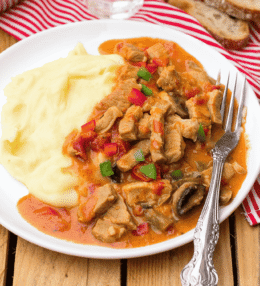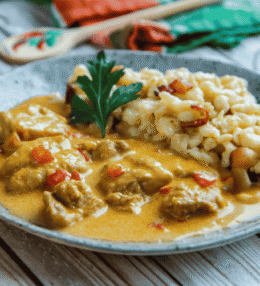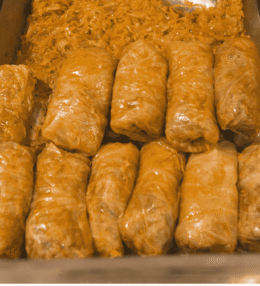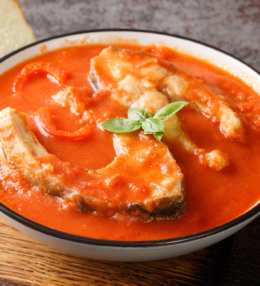
- View
Table of Contents
ToggleCarapulcra is one of Peru’s oldest known stews, and it still holds its place at the Peruvian table today. Built from native ingredients like dried potatoes and seasoned pork, it offers a deeply rooted taste of the Andes with every bite.
Rich, earthy, and smoky, Carapulcra is the kind of dish that feels both rustic and refined. Its flavours come slowly, developing in layers as it simmers. What begins as a simple combination of ingredients grows into something intensely satisfying.
Often served with rice or paired with peanut sauce, it blends highland traditions with influences from the coast. In every version, though, it remains a hearty, grounding meal that feels like it belongs to the land it comes from.
Want to dive deeper into Peruvian Cuisine? Don’t miss our post on 25 Traditional Peruvian Foods to Try
What Is Carapulcra?
Carapulcra is a Peruvian stew made with pork and papa seca, a type of freeze dried potato. The dish is slow cooked until the pork is tender and the potatoes have absorbed the broth, creating a rich, thick texture.
While recipes vary by region, the dish typically includes garlic, chilli, cloves, and sometimes wine. Peanuts may be added for depth, and versions with chicken or mixed meats are not uncommon in family kitchens.
What sets Carapulcra apart is the use of preserved potatoes. These aren’t a gimmick or a twist, but a traditional staple that brings its own flavour and structure, offering a direct link to ancient Andean preservation techniques.
Ingredients and Taste
The heart of Carapulcra lies in its two main ingredients: pork and papa seca. The dried potatoes are soaked and simmered until soft but still textured, giving the stew a unique body that sets it apart from more common potato based dishes.
The pork is browned and slow cooked to release its full flavour into the broth. Garlic, aji panca, cumin, and cinnamon are layered in for warmth and aroma. Ground peanuts are sometimes added for extra richness and a nutty finish.
The result is a stew that feels both deep and familiar. It is smoky, slightly sweet, and gently spiced, with the dried potatoes absorbing all the surrounding flavours. The texture is thick and hearty without feeling heavy or dense.
A Taste of History
Carapulcra has its roots in pre-Columbian Peru. It began as a dish prepared by the indigenous people of the Andes using dried potatoes and llama meat, cooked over stone fires. The preservation of potatoes allowed for year round meals in harsh climates.
After the arrival of the Spanish, pork replaced native meats, and new spices were introduced. Over time, Carapulcra evolved, blending indigenous techniques with colonial ingredients, yet it never lost its original spirit.
In modern Peru, Carapulcra is especially common in the central and southern regions. It is a dish passed down in families, adapted slightly from household to household but always recognisable in taste and texture.
Though it may not be as internationally known as ceviche, Carapulcra carries the weight of history in every serving. It is a reminder of Peru’s deep agricultural roots and its long tradition of turning humble ingredients into something unforgettable.
How to make Peruvian Carapulcra
Carapulcra is a soulful Peruvian stew made with rehydrated dried potatoes, slow cooked pork, and a warming blend of spices. Its rich, earthy character comes from a careful layering of ingredients and slow simmering. Expect tender meat, thickened broth, and a smoky depth from traditional ají pastes. See the recipe card at the bottom for printable directions
Ingredients
For the stew
- 500g pork shoulder, cut into bite sized cubes
- 250g papa seca (dried yellow potatoes), rinsed
- 1 large onion, finely chopped
- 4 garlic cloves, minced
- 2 tbsp ají panca paste
- 1 tbsp ají amarillo paste
- 2 tbsp roasted peanuts, finely ground
- 1 stick cinnamon
- 4 cloves
- 1 tbsp vegetable oil
- 750ml chicken stock
- Salt and black pepper to taste
For serving
- Cooked white rice
- Fresh coriander leaves (optional)
Cooking Instructions
Step 1: Rehydrate the dried potatoes
To begin, soak the papa seca in warm water for at least 1 hour until softened slightly. Drain and set aside. This helps the potatoes cook evenly and absorb flavour later. Move on to browning the pork.
Step 2: Brown the pork
Heat vegetable oil in a large heavy based pot over medium heat. Add the pork pieces and brown on all sides. Work in batches if necessary to avoid overcrowding. Set aside and prepare the flavour base.
Step 3: Sauté the aromatics
In the same pot, add chopped onion and cook until translucent. Stir in minced garlic and cook for another minute. Add ají panca and ají amarillo pastes. Cook until the mixture darkens slightly and releases a deep aroma. Continue with seasoning.
Step 4: Season and spice
Add cinnamon stick, cloves, salt, and black pepper. Stir well to coat the onion and spice mixture evenly. Let the spices bloom for 1–2 minutes. Prepare to combine with the meat.
Step 5: Combine pork and paste
Return the browned pork to the pot and stir to coat the meat thoroughly with the spice mixture. This step deepens the flavour and binds the stew’s base. Proceed to add stock.
Step 6: Add stock and simmer
Pour in the chicken stock and bring to a gentle boil. Lower the heat, cover partially, and simmer for 30 minutes. This allows the pork to begin tenderising. Transition to adding the potatoes.
Step 7: Add papa seca and peanuts
Add the rehydrated papa seca and ground peanuts to the stew. Stir gently and let it cook uncovered for another 30 to 40 minutes, stirring occasionally. The stew should thicken as the potatoes break down slightly. Adjust seasoning if needed.
Step 8: Monitor consistency
Continue simmering until the stew reaches a rich, thick texture and the pork is tender throughout. Add a splash of water if it thickens too quickly. Move to serving preparations.
Final step: Serve hot
Ladle the Carapulcra into bowls and serve hot with fluffy white rice. Garnish with fresh coriander if desired. For full authenticity, pair with a slice of fried sweet potato or boiled yucca on the side.
Variations and substitutions
- Replace pork with chicken or a pork beef blend for regional variations
- Use ají mirasol in place of ají amarillo if you prefer a smokier profile
- Swap peanuts with almond meal if needed for allergies
Cooking Tips for Perfect Carapulcra
- Toast the papa seca lightly in a dry pan before soaking for deeper aroma
- Cook slowly on low heat to let flavours develop fully
- Stir gently to avoid breaking the meat or crushing the potatoes too early
- Use homemade chicken stock for extra depth

Peruvian Carapulcra (Pork and Dried Potato Stew)
Ingredients
For the stew
- 500 g pork shoulder cut into bite sized cubes
- 250 g papa seca dried yellow potatoes, rinsed
- 1 large onion finely chopped
- 4 garlic cloves minced
- 2 tbsp ají panca paste
- 1 tbsp ají amarillo paste
- 2 tbsp roasted peanuts finely ground
- 1 stick cinnamon
- 4 cloves
- 1 tbsp vegetable oil
- 750 ml chicken stock
- Salt and black pepper to taste
For serving
- Cooked white rice
- Fresh coriander leaves optional
Instructions
- To begin, soak the papa seca in warm water for at least 1 hour until softened slightly. Drain and set aside. This helps the potatoes cook evenly and absorb flavour later. Move on to browning the pork.
- Heat vegetable oil in a large heavy based pot over medium heat. Add the pork pieces and brown on all sides. Work in batches if necessary to avoid overcrowding. Set aside and prepare the flavour base.
- In the same pot, add chopped onion and cook until translucent. Stir in minced garlic and cook for another minute. Add ají panca and ají amarillo pastes. Cook until the mixture darkens slightly and releases a deep aroma. Continue with seasoning.
- Add cinnamon stick, cloves, salt, and black pepper. Stir well to coat the onion and spice mixture evenly. Let the spices bloom for 1–2 minutes. Prepare to combine with the meat.
- Return the browned pork to the pot and stir to coat the meat thoroughly with the spice mixture. This step deepens the flavour and binds the stew’s base. Proceed to add stock.
- Pour in the chicken stock and bring to a gentle boil. Lower the heat, cover partially, and simmer for 30 minutes. This allows the pork to begin tenderising. Transition to adding the potatoes.
- Add the rehydrated papa seca and ground peanuts to the stew. Stir gently and let it cook uncovered for another 30 to 40 minutes, stirring occasionally. The stew should thicken as the potatoes break down slightly. Adjust seasoning if needed.
- Continue simmering until the stew reaches a rich, thick texture and the pork is tender throughout. Add a splash of water if it thickens too quickly. Move to serving preparations.
- Ladle the Carapulcra into bowls and serve hot with fluffy white rice. Garnish with fresh coriander if desired. For full authenticity, pair with a slice of fried sweet potato or boiled yucca on the side.
Nutrition
You May Also Like







Leave a Review